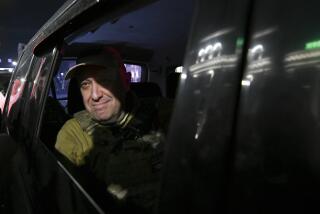Ailing Yeltsin Holds Hospital Summit With Visiting China Leader
- Share via
MOSCOW — Amid growing concern over Russia’s political stability, President Boris N. Yeltsin was reduced Monday to holding a summit with China’s president in a hospital, where the Kremlin said he is suffering from pneumonia.
The Kremlin said Yeltsin was rushed to Moscow’s elite Central Clinical Hospital on Sunday with a fever of 102 degrees. He was put on antibiotics and his temperature returned to normal, officials said, but he is likely to remain in the hospital for more than a week.
He met there for 30 minutes Monday with Chinese President Jiang Zemin, who was visiting Moscow. The men had originally been scheduled to meet for an hour.
Presidential spokesman Dmitri D. Yakushkin said Yeltsin’s health deteriorated over the weekend after he learned of the killing of Duma deputy Galina V. Starovoitova, a onetime Yeltsin ally and staunch advocate of democracy who was gunned down outside her St. Petersburg apartment late Friday.
“Those were two emotionally and psychologically difficult days for Boris Nikolayevich,” Yakushkin said on television network NTV. “He took the news about the murder of Galina Starovoitova very hard. She was a person whom he knew very well.”
Yeltsin, sidelined by illness much of his second term, has largely become a figurehead since the Kremlin acknowledged last month that his poor health would require him to hand over his day-to-day duties to Prime Minister Yevgeny M. Primakov. Nevertheless, each time his health takes a turn for the worse, it prompts renewed calls for his resignation and speculation there will be early presidential elections to name his successor.
The Kremlin’s unusual statement that the killing of Starovoitova had led to the deterioration of Yeltsin’s health demonstrated the depth of the national shock and sorrow over her slaying.
Starovoitova was one of the few leaders of Russia’s democracy movement who remained outspoken and principled to the end. She was gunned down in the kind of gangland hit that has become common across Russia.
Yakushkin said Yeltsin “is aware of the current public sentiments . . . toward the authorities, as to the measures the authorities need to take now in order to thwart and stop the criminalization of society.”
Responding to the slaying, Primakov convened a meeting of Russia’s top law enforcement officials. He called for tighter discipline to “decisively root out crime and corruption,” but rejected calls to increase police powers.
“We will not introduce any state of emergency,” he said. “This has to be said firmly. We will not take any measures which can destabilize society even more and lead to dictatorship.”
Grigory A. Yavlinsky, leader of the pro-democracy Yabloko faction in the Duma, or lower house of parliament, said the killing was the latest in a series of political murders that shows how crooks and killers are taking control of the country.
“Terror and blackmail are becoming a factor of Russia’s political life,” he said in a television interview. “Criminals are heading directly for power, clearing all obstacles. This is how coups are staged. It is not at all necessary to have tanks out on the streets.”
Communist Party leader Gennady A. Zyuganov, who lost to Yeltsin in the 1996 presidential runoff, has repeatedly called for Yeltsin to step aside and allow elections for a new president rather than serve out the remaining year and a half of his term.
Yeltsin underwent quintuple bypass heart surgery in 1996 and later suffered from double pneumonia. More recently, the Kremlin said he was suffering from “asthenia,” a vague term that could range from depression to dementia.
“Let’s wish Mr. Yeltsin a speedy recovery,” Zyuganov told reporters. “However, his ailment is incurable. He is an irresponsible person and unable to govern the country. Everyone knows that.”
Some, however, fear early elections would further destabilize the country, already is suffering from a severe economic collapse that has seen the ruble drop to a third of its previous value.
After seeing Yeltsin in the hospital, Jiang, the Chinese leader, later met with Primakov, and the two sides announced an agreement solving part of their decades-long border dispute.
The Kremlin sought to put the best spin on Yeltsin’s latest ailment, and released carefully edited footage of the two smiling presidents.
They were briefly shown standing and shaking hands, then sitting in chairs while Yeltsin, 67, talked and Jiang, 72, listened. What Yeltsin said was not made public.
During a visit later in the day to the Russian parliament, Jiang told reporters that Yeltsin was feeling “OK.”
“Everything is fine,” Jiang said.
More to Read
Sign up for Essential California
The most important California stories and recommendations in your inbox every morning.
You may occasionally receive promotional content from the Los Angeles Times.












